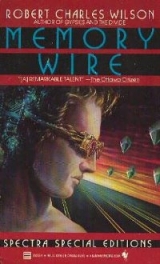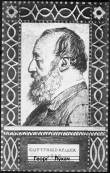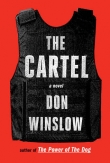
Текст книги "Memory Wire"
Автор книги: Robert Charles Wilson
Соавторы: Robert Charles Wilson
Жанры:
Научная фантастика
,сообщить о нарушении
Текущая страница: 11 (всего у книги 14 страниц)
CHAPTER 19
Keller contacted Vasquez, the Network producer, and negotiated an infusion of credit into one of his phantom accounts. Vasquez also supplied some temporary documentation and access to the downloading facilities in the Network technical compound. “But make it quick,” Vasquez urged. “I’m under a certain amount of time pressure. Is it good footage?”
Keller recalled Pau Seco, the mine and the old town, the bars and brothels. He nodded.
“Good,” Vasquez told him. “You have an appointment with Leiberman.”
Leiberman, the Network neurosurgeon, plucked out Keller’s memory chip and closed the socket wound with adhesives. In a month there would be no visible scar. “Once again,” Leiberman said loftily, “you are merely human.” He handed Keller the memory in a tiny transparent pillbox, as prosaic in its bed of cotton as a pulled tooth.
Keller went directly to the Network compound, displayed his new ID to the machine at the gate and claimed an editing booth. The technical compound sprawled over a vast expanse of desert west of Barstow, bunkers and Quonsets and a string of satellite bowls solemnly regarding the southern sky. There was a floating staff of Network engineers, but most of the people here were independent contractors—by his ID Keller was one of these—sharing time on the Network mainframes.
The booth was private, a small room crowded with monitors and mixers. Keller plugged his memory into a machine socket, named it and gave it an access code. He pulled the keyboard into his lap and put his feet up on the mixer.
Time, he tapped.
Forty-one days, the monitor said, twenty-eight minutes, fifteen seconds since the memory was activated. He registered a faint surprise: it had seemed like more.
He instructed the edit program to install index marks at every twenty-four hour point—day marks—and then divide them into hours. “Laying ordinance,” it was called. He installed special index points at Day Seven (Arrival, Rio), Day Fifteen (Arrival, Pau Seco), and Day Twenty-five (Arrival, Belem). Further index points could be installed as necessary; these were the basics, a kind of crude map. Now he could call up a day or an hour and retrieve it at once, enter it into the mainframe memory as part of the ROM package he would eventually hand Vasquez.
Protection first, however. He called up the Identity Protect subroutine, then scanned through Day Two until he arrived at a full-body image of Byron Ostler.
The central thirty-inch monitor showed Byron in front of his huge, ramshackle balsa deep in the Floats. Keller stilled the image, zoomed on the face, keyed Alter. The face was replaced abruptly with its own ghost image in topographic lines against limbo, glowing amber.
Keller used a light pencil to push the lines around.
Cheekbones up, a narrower chin. He rotated the image and similarly altered the profile. He called up flesh again and there was Byron standing by his float once more, but it was not Byron any longer; the face was not even faintly familiar. It was some older, heavyset, hawkish man. A generic face, neither good nor evil, Retain, Keller typed. The authentic image would never appear in the finished edits. Next he called up Teresa.
This was more painful. The sight of her stirred old feelings in him, a longing he labored to suppress. She moved across the monitor, regarding him.
I can’t see making this trip with somebody I don’t trust… intuition is all I have right now, you understand?
Her voice filled the booth. A sixteen-bit recreation of the trace he had laid down on this chip. She peered out from the monitor into, it seemed, his eyes. Convulsively, he called up Alter.
She became a matrix of lines, an artifact of geography.
Better that way.
Sweating now, he changed the lines with his light pencil. Moving with professional instinct, he flattened the mouth, rounded the nose, shortened the hair. He worked by rote, eyes narrowed. Wu-nien. It was a question of not caring.
He performed similar alterations on Ng and Meireilles, who might still be vulnerable—he was conscientious about protecting his sources—then paged ahead to the most significant footage, the footage Vasquez wanted, the Pau Seco footage.
Day Sixteen. The frame shook as he stepped out of Ng’s Truck, Hold Frame Pan, he typed, and played it back. Now the motion was smooth, effortless. The image flickered as he blinked away dust. Keller keyed out Hold Correct; the dropouts vanished. Beginning to look like video now. The perspective moved up to the lip of the mine, peered into its depths, began a slow pan. Audio, he typed.
The sound came up instantly. Clatter of ancient tools. Human voices ringing off distant cliffs. Abyss of time. Formigas moving in insect lines up those clay steppes and rope ladders: it might have been yesterday or today or tomorrow. Keller reached for a fader, but his hand struck the volume slide instead. The clangor of voices and tools was suddenly deafening, a roaring in the booth. He blinked at the monitor and for one giddy instant believed he had actually entered the past, transported himself somehow back to Pau Seco, that he might turn and find Teresa beside him. He slapped the Enter key.
The playback ceased. The booth filled up with silence.
When he could not bear the work any longer, he signed out and drove west. He had used a portion of the advance from Vasquez to rent a hotel room, but he didn’t head directly back. He drove west along a high, fast traffic artery until he hit the coastline, and then he turned north. On his left the Floats sprawled out to the distant gray line of the tidal dam. He drove through colonies and outposts of the cityplex, malltowns and industrial parks. He had gone miles before he understood where he was going.
Bad idea, he thought. It was a bad impulse that had brought him here: Angel sin. But he pulled off the highway when he spotted the sign.
Arts by the Sea. She had mentioned the name once, long ago.
It was not the newest or the best of these businesses. Bamboo walls sunk in a cracked concrete foundation, roof of chalky-red Spanish tile. The door rang a bell when he opened it. Inside, a buckled wooden floor supported shelves and display cases of thick protective glass gone gray with time.
The items on display were, in Keller’s judgment, fairly prosaic Float work. Soapstone carvings, junk collages, a few high-priced crystal paintings under glass. He gazed a while at a stylized trance landscape, bread-loaf hills rolling under an azure sky, treehouses like pagodas clustered in the foreground. Some real place, Keller thought, some Exotic venue wrenched out of time. He was staring at it when the proprietor pushed through a curtain from the rear of the store.
She was a chunky gray-haired woman in layered pastel skirts, and she regarded Keller across a chasm of suspicion. “Is there something you were especially interested in?”
“A certain artist,” he said. “I understand you sold some of her work. Her name is Teresa… Teresa Rafael.”
She looked at him more carefully now, his face and his clothes. “No,” she said finally. “We have nothing.”
Keller extracted the Pacific Credit gold card Vasquez had obtained for him. In fact his account was strictly limited, but the card itself was impressive. He slid it across the counter; the woman ran her finger over the embedded microchip. “She hasn’t displayed here for years. Her work has appreciated in value. You understand? She has a reputation now. A following.”
“I understand.”
The woman licked her lips. “In the back,” she said.
Keller followed her through the curtain. There were a dozen pieces in this smaller room—all “appreciated,” Keller assumed: it was a commonplace practice for street dealers to hold back the work of a promising newcomer. But he recognized instantly which of it was Teresa’s. “These,” the woman said loftily, “are early pieces.”
She must have been a girl when she did this, Keller thought. He was impressed. Some of the work was awkward; none of it was naive. A few pieces displayed the obvious skill and muted passion that had made her successful. Mostly they were junk sculptures, assembled out of pipe and copper wire and mechanical oddments scavenged from the old Float factories gutted in the fire; but she had polished and shaped the material until it seemed nearly alive, more liquid than solid.
“You’re familiar with the work?”
“No… not really.”
Under the woman’s alarmed stare he picked up a small piece of sculpture and examined it. The metallic tangle resolved into the image of a face. No—two faces. He rotated the piece in his hand.
A woman’s face, gaunt but curiously childlike in its sadness.
. And a child’s face, with an adult’s expression of fierce resolve.
The proprietor took it from him. Keller was startled; he restrained an impulse to take it back. She named a sum, and it was approximately the money Vasquez had entered into Keller’s account, minus living expenses. A huge amount. But he agreed without haggling.
He drove home with the piece beside him in the car, confused and faintly shocked at himself. He was like a sleepwalker, acting out some dream. He knew only that he wanted something from this knot of metal, something tangible; a piece of her, he thought, a relic, or that forbidden and finally dangerous thing—a memory.
In the morning he went back to the Network technical compound and called up yesterday’s work on the monitor.
The sight of it shocked him. He sat back in the cloistered silence of the editing booth and stared.
He had altered Teresa’s features to protect her anonymity. Standard procedure, and he had worked by rote. Successfully. It didn’t look like Teresa anymore.
But the face he had given her was Megan Lindsey’s.
CHAPTER 20
Stephen Oberg had stepped outside the bounds of propriety -often since the debacle at Pau Seco, but he did not feel authentically like an outlaw until the day he rented a cheap balsa in the Floats.
It was an outlaw place; he was an outlaw in it. The faces he saw along the market canals were furtive, obscure, hidden. He imagined he looked the same. A shadow-thing now, outside the bright thoroughfares of law and custom. The only light here was the beacon of his own intense desire; the abyss of the ocean was unnervingly close.
It worried him a little. The night he moved into the balsa, he rolled out his mattress over the stained wooden floor and wondered whether he might have gone too far. He had always depended on an external structure for discipline, for rules. The Army, in an important way, had made him what he was. They had named him. Potent magic. He was a Latent Aggressive. And it was not a pathology but a talent, a useful quirk of character. He. could be depended upon for certain acts. He was conscienceless but loyal: it was a loyalty that had never faltered.
Until now. Now he was an outlaw, a loose cannon. He had assumed a task and made it his own, and he could not see beyond it. Without him, the deep-core stone from the Pau Seco mine might be casually reproduced, might spread—and surely that was what its unknowable creators had intended—among the furtive and marginal people of the Floats. And he could not allow that.
Because he understood, and he was persuaded that he was the only one who understood. He understood the nature of the stone: its alienness, its powers of memory. He had touched Tavitch, and through Tavitch, the stone. And the stone had touched him.
It was a bad and dangerous thing, a kind of weapon. It eroded the marrow of the soul. It must not be allowed to exist.
He believed this as fiercely as he had believed anything in his life.
The force of his belief was its own justification. It comforted him.
It was a fire to warm him, out here in this wilderness.
In the morning he placed a call to an Agency bureaucrat back east, a man named Tate. Tate, seeing Oberg’s face in the monitor, did an elaborate double-take. “You!” he said.
Oberg smiled. “Me.”
“One minute.”
Oberg waited while Tate called up a security program, shunting his terminal out of the routine record-and-monitor loops. Tate, a pockmarked man of Oberg’s age, looked harried when he reappeared. “That was a stupid thing to do!”
“I need your help.”
“You’re hardly entitled to it. Everybody knows you went rogue back in Brazil. Fucking bad form, Steve.”
“This isn’t an official call.”
“We’re not friends.”
“We’re old friends,” Oberg said. “The hell we are.”
But it was true. If not friends, then at least something like it: comrades, colleagues. Tate had been a point man for Oberg’s platoon.
It was not something that drew them together; they had seen each other only a handful of times since the war. But they had parallel careers; and there was that unspoken bond, Oberg thought, the tug of old loyalties. He said, “I want whatever you have on the three Americans. I assume you processed the files from SUDAM. There must have been something.”
“That has nothing to do with me.”
“You have clearances.”
“I’m not your dog. I don’t fetch when you say fetch.” He looked pained. “This is not your business anymore.”
“As a favor,” Oberg said.
“As far as I know,” Tate said, “there’s nothing substantive. A couple of Floaters, no extant ID except what they bought. You know all this.”
“There’s the third man.”
“Keller. Well, we have the name. But this all went into limbo when you turned up AWOL. Are you listening? Steve: nobody cares.”
“Check it out for me,” Oberg said. “Please.”
“Give me a number where you are. I’ll call you back.”
“I’ll call you,” Oberg said, and cleared the monitor.
For a couple of days he explored the neighborhood.
It was a seedy area south of the factory district, close to the urban mainland. Most of the people here worked mainland jobs during the day. At night the boardwalks lit up with paper lanterns; the bars and dance shacks opened for business. Commerce came the opposite way after dark —venturesome mainlanders shopping for the illicit pleasures of the Floats. These were more legendary than real, Oberg understood. But there were certain things for sale.
Drugs, for instance. Well, drugs were everywhere. It was a truism that the economy could not function—or at least compete—without the vast array of stimulants, IQ enhancers, and complex neuropeptides for sale on the street or by prescription. Oberg had done time with the DEA and understood that it was a traffic no one really cared to interdict. Most of the field agents he knew were either neurochemically enhanced or skimming money from the trade. Or both. It was called free enterprise.
But the Floats made dealing a little looser. No government functionaries to take a percentage, although he understood the Filipino and East Indian mobs would sometimes muscle in. Generally, though, it was a loose friends-of-friends distribution network… and that worked in his favor.
For three nights he frequented a bar called Neptune’s, which catered almost exclusively to mainlanders. He watched the canal traffic, the waitresses, the tidal flow of alcohol over the bar. In particular he watched a lanky, pale teenager who occupied a rear booth—same booth all three nights– and who would periodically step out with one or two customers, through a back door onto a catwalk overlooking a waste canal. The boy was not a hooker; there were others, more sophisticated, handling that trade. But he fit the mainlander’s image of a drug pusher, and Oberg guessed that was an advantage here; it was like a sign, an advertisement. The teenager kept his hands in his oversized jacket, and when he brought them out, Oberg imagined, they would be holding pills, powders, blotters.
His fourth night in the Floats he approached the boy.
“I would like to buy drugs,” he said softly.
The teenager looked at him, amused. “You would like a hat?”
Oberg showed him the vial he had taken from Teresa’s studio. He shook out the resinous black pill into the palm of his hand and held it so the boy could see it.
The boy laughed and looked away. “Shit,” he said.
“I’m serious,” Oberg said.
“I bet you are.” The teenager tapped his hand nervously against the tabletop.
Probably he was doing some CNS stimulant himself, Oberg thought, pumping chemical energy out of his neurons. Crash every morning, up every night. It was pathetic, and he resented the boy’s condescension. “I can pay,” Oberg said.
The boy took a second look. “You prepared to buy in quantity? I don’t sell candy.”
“Whatever you want.”
“Well.”
The boy led him outside.
The walkway was narrow and dark. Presumably, it was useful for dumping trash. It overlooked a waste canal, dark water drawn down open conduits to the sea. There was a single sodium-vapor lamp overhead and nothing beyond the canal but the blank stucco wall of an empty warehouse. The sound of music trickled out from the bar through this single door, closed now. The sound was anemic and far.-seeming.
The boy dug into the deep recesses of his jacket and brought out a sweaty handful of pills. They glistened in the harsh light. They were small and black. “This is all I have,” the boy was saying, bored with the transaction already, “but you come back Tuesday, I might—hey!”
Oberg swept his fist out and knocked the boy’s hand away. The pills flew up in an arc, twinkled a moment, dropped inaudibly into the canal.
The boy stared, a little awed. “Son of a bitch!” No one had ever done this to him, Oberg thought. Oberg could have been anyone, a mob enforcer, a new competitor. But the boy had only dealt with mainlanders. He was surprised and confused.
Oberg waited.
The boy’s eyes narrowed. “You can fucking throw them away if you want to,” he said finally, “but you pay for ’em either way. So pony up, asshole.” He took a knife from under his belt.
Oberg had anticipated it. He leaned inside the boy’s reach, bent the arm, extracted the knife. He held it against the boy’s throat.
He felt a pleasure in this that he had not felt for years.
He understood it was something he enjoyed, the rush of it, something he had missed all this time. An old and profound pleasure. But it was not a thought worth dwelling on.
Loose cannon, he thought giddily.
The boy was wide-eyed and pale.
“Tell me where you got them,” Oberg said.
The boy said, faintly, “Fuck you!”
Oberg let the blade draw out a line of blood. The blood was bright and oily in the stark light. He felt the boy twisting against his restraint. “Tell me,” he said.
It took time, but in the end he extracted four names and four approximate canal addresses. It would be useful, an approach to the woman, especially if Tate failed to produce any useful information. The boy relaxed, sensing that Oberg had what he wanted: the ordeal was over.
And it was. But not the way the boy expected. Oberg drew the knife deeply across the boy’s throat and in a single motion levered the body over the railing and down into the waste canal. There was a momentary thrashing, a choking sound, silence immediately after.
It felt good. It was deeply gratifying.
He used a handkerchief to clean the blade of the knife, and threw the handkerchief after the body.
The knife he took home.
The past is dead and gone, he thought. That was the way it should be.
He had trouble sleeping sometimes. Tonight, for instance. In part it was the adrenaline that had rivered through him at the death of the boy. In part, a more obscure stimulation.
In his worst dreams he was back in Brazil, back in the war, running what his orders called “punitive raids” on farms and villages where guerillas had been harbored. In the dreams he killed people but they would not stay safely dead: they rose and pointed accusing fingers at him; they protested their innocence. He killed them once, twice, three times. They rose up sullenly and said his name.
In Virginia he had touched Tavitch when Tavitch was touching the stone; and Tavitch had looked into his eyes and had seen these same dreams. But they were not dreams. That was the terrifying thing. Somehow, through Tavitch, through the Pau Seco stone, it had actually happened. The dead had risen stubbornly; the dead had pronounced his name.
He lay in the darkness and was haunted by the memory. It was unnatural; it was alien, an alien ruse, a mind trick. The past was gone, the dead were dead and did not speak, and everybody dies; one day Oberg would be dead and silent, too, and that was as it should be: the broad and welcoming ocean of oblivion. It made life bearable. It was sacred. It should not be tampered with.
With this new thought he achieved ease and finally a sleep as calm as that vast and silent ocean; he did not dream; he woke strengthened in his resolve.
In the morning he made a second call to Tate.
“Keller is an Angel,” Tate said. “He’s working for an independent producer name of Vasquez. He’s in L.A. now, probably downloading at the Network compounds.” He regarded Oberg guiltily. “I assume this is what you wanted.”
“Yes,” Oberg said.
“You’re crazy, Steve, you know that? You’re fucking nuts.”
It might be true. It didn’t matter. The monitor blanked, and Oberg stared a long moment at his own reflection in it.








